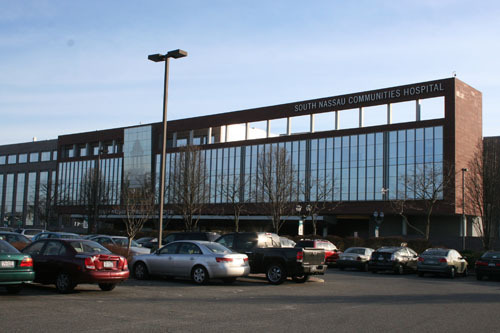Feeling inflation’s sting
South Nassau Communities Hospital takes action to deal with rising costs
South Nassau Communities Hospital, like business and residents all over the South Shore, is having to take measures to deal with the rising costs of fuel, food and other commodities.
Mark Bogen, vice president of finance at the hospital, said that inflation had not been a problem until recently. “It wasn’t so bad,” he said. “We’ve been OK up until now.”
But like his colleague Elizabeth Schiefke, director of material management at South Nassau, Bogen has seen a progressive increase in the price of commodities in the last several weeks. “There’s been a slow, steady creep,” Schiefke said. “We’re going to have to make some tough decisions possibly.”
Some of the high costs, Bogen said, are for food. There has been a lack of pastry products lately due to lower production of grains, which has driven the price of those items up. Meat has become more expensive because of fuel transport costs.
The hospital’s menu has been adjusted to include less of these items than normal, and food deliveries are being kept to a minimum each week. Sodexo, a firm that specializes in facilities management, provides food services to the hospital.
“We’ve been lucky,” said Bogen, who will consider replacing items removed from the hospital menu with less-expensive ones. “But it could become more difficult.”
The cost of cotton, another commodity the hospital relies on, has also risen of late, and with it linens and hospital clothing. Schiefke said that prices have increased by as much as 9 percent because of poor growing conditions in China. As a result, the hospital has had to “bite the bullet” and pay more, since these are important product to provide to patients.
When it comes to fuel, South Nassau has delivery contracts with several local vendors who supply it, but it negotiates fuel purchases with national vendors in order to receive the biggest bang for its buck. Bogen says that the hospital’s purchasing power has given it some choices of vendors, allowing it to mitigate some of the rising costs. The facility has three fuel tanks in operation on site: two 20,000-gallon tanks and one 5,000-gallon tank.
The hospital relies on outside contractors for ambulance services as well. So far, Bogen said, none of that service has been eliminated because of excessive fuel costs. He is unsure whether it may be cut back in the coming months, but, he added, he is aware of that possibility as the summer approaches and inflation is expected to grow.
South Nassau operates with electricity supplied by Rockville Centre — a benefit that has helped it save money during the recession. The Village of Rockville Centre has its own power station and sells its electricity to residents for a lower rate than the Long Island Power Authority.
Bogen said that the hospital has faced worse economic conditions in the past. In particular, inflation was more difficult for it to manage in 2008 because of fuel surcharges.
He expects the price of oil to increase to between $140 and $150 per barrel this summer — though he still holds out hope that it won’t.
“Anything’s possible,” he said. “I honestly don’t know what will happen, but it’ll be an interesting next 18 months leading up to the next [presidential] election.”






